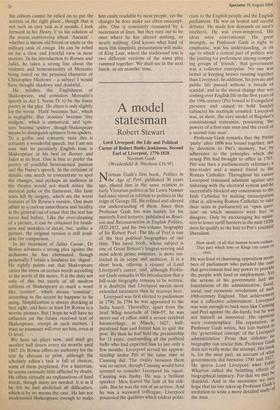A model statesman
Robert Stewart
Lord Liverpool: the Life and Political Career of Robert Banks Jenkinson, Second Earl of Liverpool, 1770-1828 Norman Gash (Weidenfeld & Nicolson £16.95)
Norman Gash's first book, Politics in the Age of Peel, published 30 years ago, placed him in the same relation to early Victorian politics as Sir Lewis Namier had once stood in relation to politics in the reign of George III. He refined and altered our understanding of them. Since then Professor Gash has won laurels for his masterly Ford lectures, published as React- ion and Reconstruction in English Politics, 1832-1852, and his two-volume biography of Sir Robert Peel. The life of Peel is one of the best political biographies of our time. This latest book, whose subject is one of Great Britain's longest-serving and most adroit prime ministers, is more res- tricted in its scope and ambition. It is a short book, offering a résumé of Lord Liverpool's career, and, although Profes- sor Gash remarks in his introduction that a full-scale biography remains to be written, it is doubtful that Liverpool merits more extended treatment than he receives here.
Liverpool was first elected to parliament in 1790. In 1794 he was appointed to the India board. Thereafter, apart from the brief Whig interlude of 1806-07, he was never out of office until a severe cerebral haemorrhage, in March, 1827, half- paralysed him and forced him to quit the post. By then he had held the premiership for 15 years, confounding all the political buffs who had expected him to last only a few months. Liverpool served his appren- ticeship under Pitt at the same time as Canning did. The rivalry between them was no secret, though Canning would have scorned to consider Liverpool his equal. Canning was flashy. He was a brilliant speaker. Men feared the lash of his ridi- cule. But he was the son of an actress. And he was a wayward colleague. Liverpool possessed the qualities which endear politi- clans to the English people and the English parliament. He was an honest and careful debater. He made few demands on men's intellects. He was even-tempered. His ideas were conventional. His great strength, as Professor Gash is right to emphasise, was his understanding, in an age in which a central part of politics was the jostling for preferment among compet- ing groups of 'friends', that government was a collective enterprise. No one was better at keeping horses running together than Liverpool. In addition, his private and public life passed without a breath of scandal, and in the moral change that was coming over English life in the first years of the 19th century (Pitt bowed to Evangelical pressure and ceased to hold Sunday cabinets) his rectitude counted. Liverpool was, in short, the very model of Bagehot's constitutional statesman, possessing 'the powers of a first-rate man and the creed of a second-rate man'.
Professor Gash remarks that the Pittite
'party' after 1806 was bound together, not by devotion to Pitt's memory, but by adherence to the principles which the young Pitt had brought to office in 1783. Pitt was then a parliamentary reformer, a free-trader and a muted friend to the Roman Catholics. Throughout his career Liverpool remained adamant against any tinkering with the electoral system and he successfully blocked any concessions to the Irish Catholics by making emancipation (that is, allowing Roman Catholics to take their seats in parliament) an 'open ques- tion' on which ministers were free to disagree. Only by encouraging his minis- ters to lower tariff barriers in the mid-1820s does he qualify as the heir to Pitt's youthful liberalism.
How small, of all that human hearts endure. That part which laws or Kings can cause or cure.
He was fond of chastising opposition mem- bers of parliament who paraded the cant that government had any power to provide the people with food or employment. Yet the actions of his government laid the foundations of the administrative, fiscal, social and economic revolutions of mid- 19th-century England. That achievement was a collective achievement. Liverpool was wise enough to back men like Canning and Peel against the die-hards, but he was not himself an innovator. His opinions were commonplace. His reputation, a s Professor Gash writes, has lain buried in the 'generalised concept' of the Liverpool administration. From that oblivion 11,.° biography can rescue him. Professor Gas'', does not really make the attempt. His book is, for the most part, an account of what governments did between 1790 and He spares Lord Liverpool what Edith r Wharton called the belittling biographical intimacy. For that we may be thankful. And in the meantime we 1112,5 Y hope that no one takes up Professor Gash's invitation to write a more detailed study of
the man. effects 0;






































 Previous page
Previous page